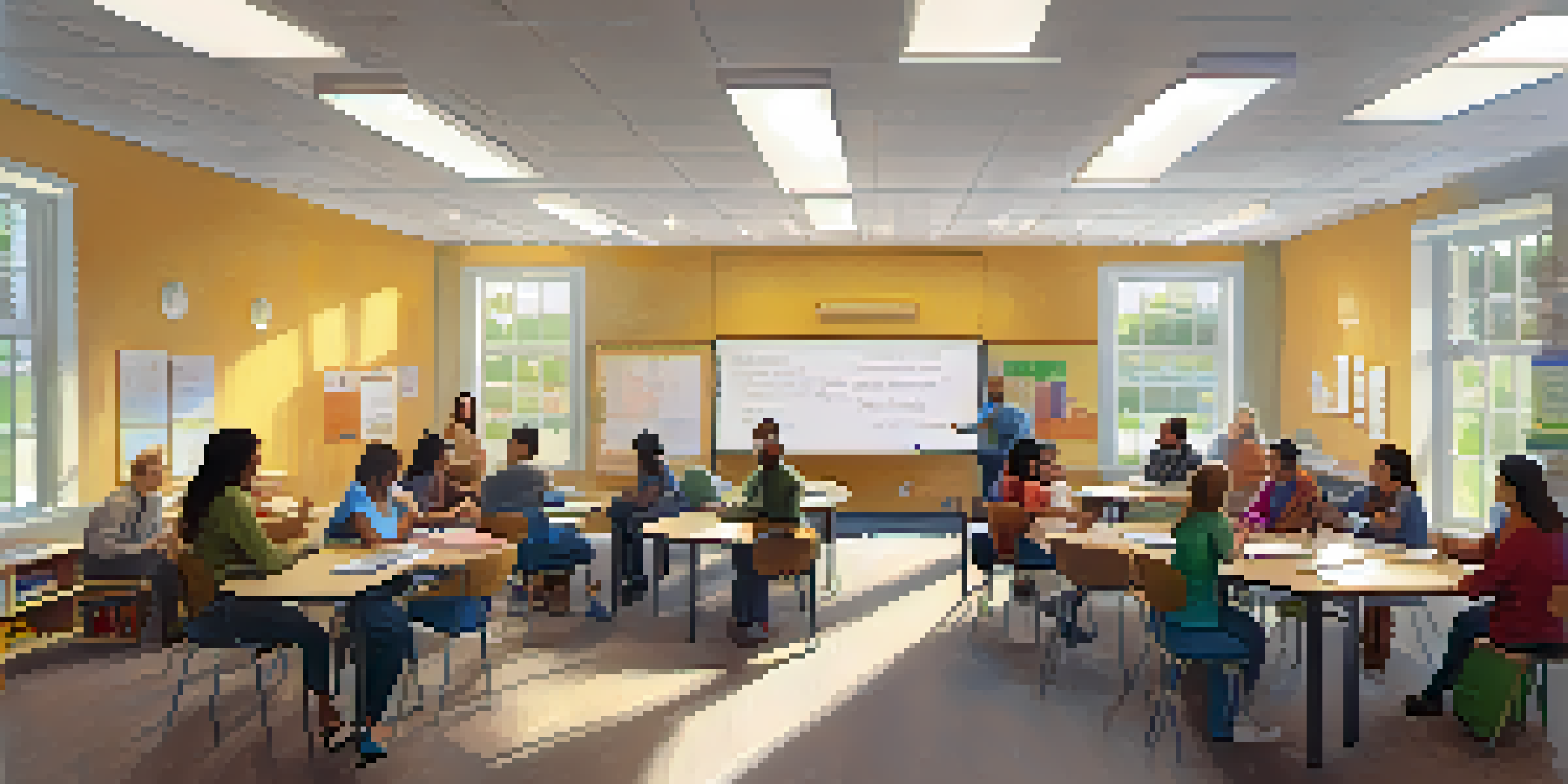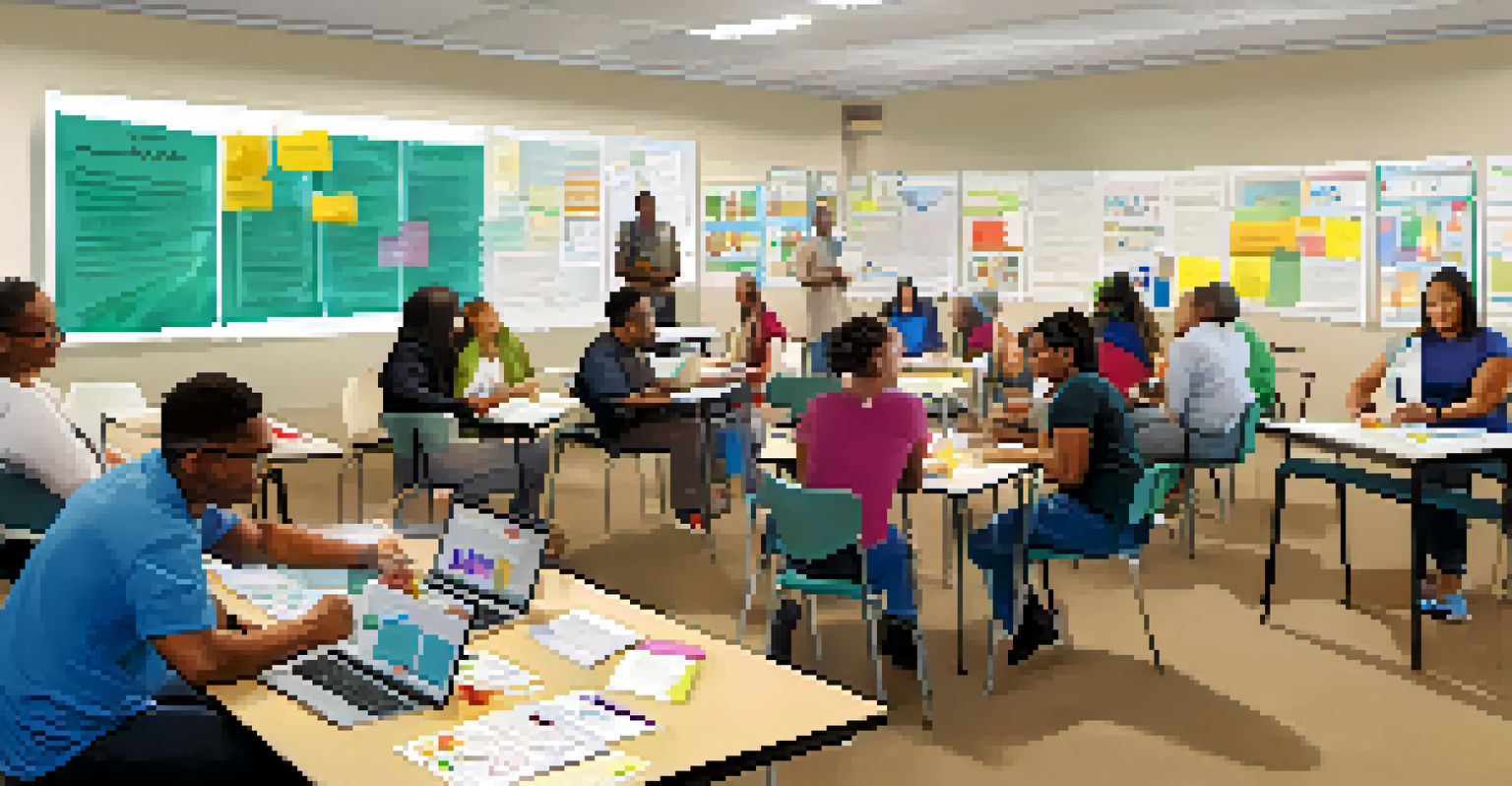Innovative Teaching Strategies for Adult Learners

Understanding Adult Learning Principles
Adult learners come with a wealth of life experiences that shape their learning. Unlike traditional students, they often seek relevance in what they are learning and how it applies to their lives. Understanding principles such as self-direction and practical application can greatly enhance the educational experience.
Education is not the filling of a pail, but the lighting of a fire.
For example, incorporating real-world scenarios into lessons allows adult learners to connect theory with practice. This not only keeps them engaged but also reinforces the importance of the material. It transforms the classroom into a collaborative space where knowledge is built on shared experiences.
By recognizing these principles, educators can create a more tailored approach that respects the autonomy and unique backgrounds of adult learners. This sets the stage for a more dynamic and engaging learning environment.
Utilizing Technology to Enhance Learning
In today’s digital age, leveraging technology can be a game-changer for adult education. Tools such as online learning platforms, video conferencing, and interactive apps foster a flexible learning environment that suits busy adults. This accessibility allows learners to engage with materials at their own pace and convenience.

For instance, using platforms like Zoom or Google Classroom can facilitate real-time discussions and group projects, breaking the barrier of traditional classroom settings. This not only enhances collaboration but also promotes a sense of community among adult learners who might be juggling work and family responsibilities.
Embrace Adult Learner Autonomy
Recognizing the unique experiences of adult learners allows educators to create a tailored and engaging educational environment.
Moreover, integrating multimedia resources such as podcasts and videos can cater to different learning styles, making lessons more engaging. By embracing technology, educators can create a rich, interactive learning experience that resonates with adult learners.
Promoting Collaborative Learning Experiences
Collaboration can significantly enhance the learning experience for adults. By encouraging group work and discussions, educators tap into the collective knowledge and diverse perspectives of the group. This not only enriches the learning process but also fosters a sense of belonging among learners.
Tell me and I forget, teach me and I remember, involve me and I learn.
For example, implementing peer teaching sessions allows learners to share their expertise and learn from each other, reinforcing their understanding. This method also helps build essential soft skills, such as communication and teamwork, which are invaluable in both personal and professional contexts.
Creating an environment that values collaboration can lead to deeper understanding and retention of knowledge. It transforms the learning process into a shared journey, where everyone contributes and benefits from one another.
Incorporating Problem-Based Learning
Problem-based learning (PBL) is an effective strategy that engages adult learners by placing them in real-world scenarios. This approach encourages critical thinking, creativity, and problem-solving skills as learners work through challenges that they may encounter in their work or daily lives. By focusing on practical issues, the material becomes more relevant and engaging.
For instance, in a business course, presenting a case study for learners to analyze and propose solutions can spark lively discussions and innovative ideas. This hands-on approach allows learners to apply theoretical concepts in a practical context, enhancing their understanding and retention.
Leverage Technology for Learning
Utilizing digital tools enhances flexibility and accessibility, enabling adult learners to engage with materials at their own pace.
Implementing PBL not only makes learning more interactive but also prepares adult learners for real-life challenges. It empowers them to take ownership of their learning and equips them with tools to tackle future problems confidently.
Flexibility in Learning Paths
Adult learners often juggle multiple responsibilities, making flexibility essential in their educational journey. Offering various learning paths and schedules can greatly accommodate different lifestyles. This flexibility allows learners to choose options that best fit their personal and professional commitments.
For example, providing asynchronous learning opportunities where materials can be accessed anytime empowers learners to study when it suits them best. This not only reduces stress but also enhances motivation, as learners can engage with the content at their own pace.
By prioritizing flexibility, educators can create a more inclusive learning environment that respects the diverse needs of adult learners. This adaptability fosters a positive learning experience and encourages lifelong learning.
Fostering a Supportive Learning Environment
Creating a supportive learning environment is crucial for adult learners to thrive. This includes cultivating a culture of respect, encouragement, and open communication. When learners feel safe and valued, they are more likely to participate actively and share their thoughts and ideas.
For instance, starting each session with a check-in can help establish rapport and create a sense of community. Encouraging feedback and providing constructive criticism further supports learners in their growth journey, allowing them to feel more comfortable in expressing themselves.
Foster Collaboration and Support
Encouraging collaborative learning and providing a supportive atmosphere boosts engagement and builds confidence among adult learners.
A supportive atmosphere not only enhances engagement but also builds confidence among adult learners. By prioritizing emotional and social well-being, educators can significantly impact the overall learning experience.
Continuous Assessment and Feedback
Regular assessment and feedback are vital components of adult education. Unlike traditional methods that focus solely on grades, continuous feedback allows learners to understand their progress and areas for improvement. This ongoing dialogue fosters a growth mindset, encouraging learners to embrace challenges as opportunities for development.
For example, using formative assessments, such as quizzes or reflective journals, can provide valuable insights into learners’ understanding and engagement. This practice helps educators tailor their teaching strategies to better meet the needs of the group.

By promoting a culture of continuous assessment, educators can guide adult learners on their educational journey, ensuring they feel supported and motivated to achieve their goals.